Keeping Mosquitoes at Bay: Practical Tips for a Bite-Free Vacation
Understanding Mosquito Behavior and Habitats
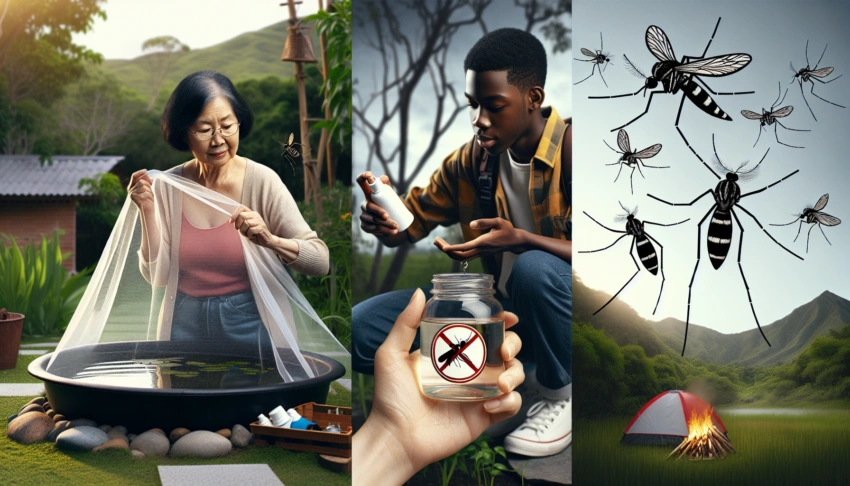
Keeping Mosquitoes at Bay: Practical Tips for a Bite-Free Vacation
To effectively prevent mosquito bites during your vacation, it is crucial to understand the behavior and habitats of these persistent pests. By gaining insights into where mosquitoes thrive and when they are most active, you can tailor your strategies to minimize encounters and enjoy a bite-free vacation.
1. Common Mosquito Breeding Grounds
Mosquitoes are notorious for their ability to breed in a variety of environments, but they have a strong preference for areas with standing water. This is because mosquito larvae require water to develop. Common breeding grounds include ponds, marshes, and even small puddles. In urban areas, mosquitoes can breed in clogged gutters, flower pots, and neglected swimming pools. To minimize mosquito populations, it is essential to identify and eliminate these potential habitats around your vacation residence. Regularly emptying containers that collect water, ensuring proper drainage, and maintaining clean gutters can significantly reduce breeding sites.
Common Mosquito Breeding Grounds and Prevention Tips
| Breeding Ground | Characteristics | Prevention Method |
|---|---|---|
| Stagnant Water | Found in ponds, puddles, and marshes | Drain or treat water with larvicides |
| Urban Containers | Includes flower pots, gutters, and bird baths | Regularly empty and clean containers |
| Unused Pools | Standing water in neglected swimming pools | Cover or treat with mosquito dunks |
2. Mosquito Activity Patterns
Mosquitoes are most active during dawn and dusk when temperatures are moderate, and the sun is not as intense. This is known as the crepuscular period. During these times, mosquitoes are on the hunt for food, making it crucial to be extra cautious. Additionally, mosquitoes are drawn to humid and overcast conditions, as these environments provide ample opportunities for them to find hosts and breed. By planning outdoor activities during the middle of the day, when mosquitoes are less active, you can reduce your risk of bites. When venturing out during peak activity times, wearing protective clothing and using repellents is essential.
3. Species-Specific Insights
Understanding the behavior of different mosquito species can further enhance your prevention strategies. For instance, the Aedes aegypti, known for transmitting diseases like Zika and dengue, prefers to bite during the day and is commonly found in urban areas. Meanwhile, the Anopheles mosquito, responsible for spreading malaria, is more active at night. Recognizing these patterns allows you to employ targeted measures, such as using treated nets for nighttime protection against Anopheles mosquitoes or ensuring daytime protection against Aedes mosquitoes with appropriate repellents and clothing.
Arming yourself with knowledge about mosquito behavior and habitats not only helps in mitigating bites but also plays a crucial role in preventing mosquito-borne diseases. By being proactive and vigilant, you can enjoy a more comfortable and health-conscious vacation experience.
Effective Mosquito Repellents
To enjoy a truly carefree vacation, selecting the right mosquito repellent is crucial. Different repellents offer varying levels of protection, but understanding which option suits your needs will significantly enhance your experience.
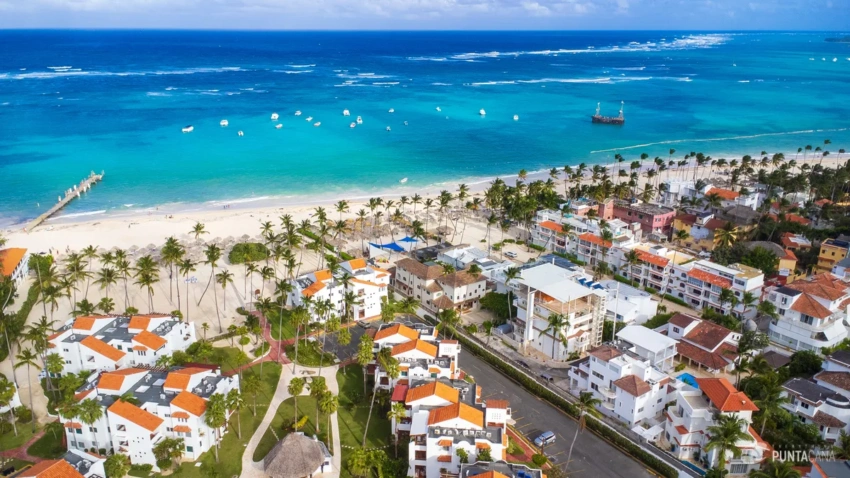
Punta Cana
1. Chemical Repellents: DEET and Picaridin
DEET (N,N-Diethyl-meta-toluamide) is one of the most effective and widely used insect repellents globally. Originally developed by the US Army, it is celebrated for its ability to provide long-lasting protection against a variety of mosquito species. DEET is available in various concentrations, ranging from 5% to 100%. For most situations, a concentration of 20% to 30% is sufficient to provide effective protection for several hours. Remember to reapply DEET-based repellents every 4 to 8 hours, depending on the concentration.
Picaridin, another popular chemical repellent, offers an alternative to DEET. It is known for its non-greasy feel and pleasant odor, making it a preferred choice for those with sensitive skin. Picaridin is effective against mosquitoes, ticks, and flies and is often found in concentrations ranging from 10% to 20%. It provides comparable protection to DEET and is less likely to damage synthetic materials or fabrics.
2. Natural Repellent Alternatives
For those seeking a chemical-free approach, natural repellents offer a promising solution. Essential oils such as citronella, eucalyptus, and lavender have gained popularity for their mosquito-repelling properties. Citronella oil, often used in candles and sprays, can be effective in short bursts but requires frequent reapplication.
Lemon eucalyptus oil is another natural alternative endorsed by the Centers for Disease Control and Prevention (CDC). Its active ingredient, p-menthane-3,8-diol (PMD), has been shown to provide protection similar to low concentrations of DEET. However, it’s important to note that natural repellents generally offer shorter protection periods and may not be as effective in areas with high mosquito density.
3. Application Tips for Maximum Protection
Proper application of mosquito repellents is essential to ensure maximum protection. Follow these tips to enhance the effectiveness of your chosen repellent:
- Apply repellents evenly over all exposed skin, taking care to avoid contact with eyes, mouth, and open wounds.
- Reapply as directed on the product label, especially after swimming or excessive sweating.
- Apply sunscreen before repellent if you are using both, as some repellents can reduce the effectiveness of sunscreen.
- For children, apply repellent to your hands first, then carefully spread it on their skin, avoiding hands to prevent accidental ingestion.
- For adults, consider applying repellent to clothing as well, as mosquitoes can bite through thin fabrics.
Our Best Ocean View Villa Rentals in Punta Cana
While enjoying the beautiful vistas of Punta Cana, ensure your vacation is mosquito-free with the right choice of repellents. Our villas offer a serene escape with added comfort and protection.

Exclusive Ocean View 5-Star Cap Cana Villa for Rent - Chef, Butler, Maid & Golf Cart
from $4600 night Read more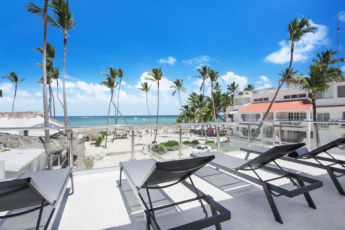
Luxury Villa Right on Los Corales Beach - With Heated Pool, Maid & Chef in Bávaro
from $2995 night Read moreProtective Clothing and Gear
When planning a vacation in mosquito-prone areas, protective clothing and gear can be your first line of defense against these pesky insects. By making informed choices about what to wear and which gear to bring, you can significantly reduce the likelihood of mosquito bites.
1. Choosing the Right Fabrics
Selecting the right fabric is crucial in preventing mosquito bites. Tightly woven fabrics create a physical barrier that mosquitoes cannot penetrate easily. Fabrics such as denim, nylon, and polyester are effective choices. On the other hand, loose-knit and thin fabrics, like linen and cotton, may not provide sufficient protection, as mosquitoes can easily pierce through them.
Another innovative option is clothing treated with permethrin, a pesticide that repels mosquitoes. This treatment is often used on outdoor gear and is known to last through several washes. However, it’s important to follow the manufacturer’s instructions for safe use.
2. The Role of Colors and Patterns
Colors and patterns of your clothing can surprisingly influence mosquito attraction. Studies have shown that dark colors, such as black and navy, tend to attract mosquitoes more than light colors. This is because dark colors retain heat and make you more visible against the horizon, drawing mosquitoes towards you.
Conversely, wearing light-colored clothing can help you stay cooler and less noticeable to mosquitoes. Patterns that blend with natural surroundings can also reduce visibility to mosquitoes. Opting for clothing in shades of white, beige, or pastel can make a significant difference during your vacation.
3. Innovative Mosquito-Proof Gear
The market is steadily growing with innovative products designed to provide additional barriers against mosquitoes. Here are some cutting-edge options:
- Mosquito Repellent Bracelets: These bracelets emit scents that repel mosquitoes and are a convenient option for both children and adults.
- Camping Hammocks with Built-in Nets: Ideal for outdoor enthusiasts, these hammocks offer a comfortable resting place while keeping mosquitoes at bay.
- Bug-Repellent Socks: Treated with repellent, these socks offer additional protection for your feet and ankles, areas often exposed to bites.
- Portable Mosquito Nets: Compact and easy to set up, these nets are perfect for creating a mosquito-free zone around your sleeping area.
Comparison of Mosquito-Proof Gear
| Gear Type | Protection Level | Convenience | Price Range |
|---|---|---|---|
| Mosquito Repellent Bracelets | Moderate | High | $5 – $20 |
| Camping Hammocks with Nets | High | Medium | $30 – $100 |
| Bug-Repellent Socks | Moderate | High | $10 – $30 |
| Portable Mosquito Nets | High | Medium | $15 – $50 |
These innovative products are not only functional but also provide peace of mind, making your vacation more enjoyable and bite-free. Remember, combining these protective measures with other strategies, such as repellents and environmental controls, can offer comprehensive protection against mosquitoes.
Creating a Mosquito-Free Environment
Transforming your vacation spot into a mosquito-free haven can significantly enhance your comfort and safety. Employing a combination of physical barriers, traps, and airflow techniques can effectively minimize mosquito presence.
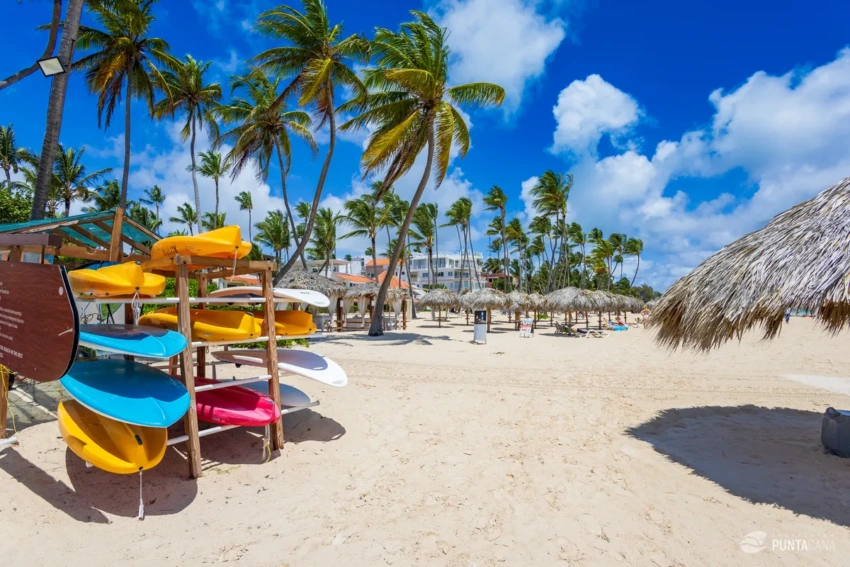
Punta Cana
Using Mosquito Nets and Screens
Mosquito nets and screens are among the most effective tools for keeping mosquitoes at bay, especially in tropical destinations. These physical barriers are easy to install and provide a simple yet efficient solution to prevent mosquito entry.
- Choosing the Right Net: Opt for a net with a mesh size of at least 1.2 mm, which is small enough to block mosquitoes but still allows for airflow. Nets treated with insecticide offer added protection.
- Screening Windows and Doors: Ensure that all windows and doors are fitted with screens. Regularly check for holes or tears and repair them promptly to maintain effectiveness.
- Portable Mosquito Nets: For travelers, portable nets can be an invaluable addition to your packing list. These are particularly useful in accommodations lacking proper screens.
Setting Up Mosquito Traps
Mosquito traps can significantly reduce the local mosquito population by attracting and capturing them. These devices vary in design and operation but are generally easy to use and effective.
- CO2 Traps: These traps mimic human breath by emitting carbon dioxide, attracting mosquitoes and trapping them. They are highly effective but can be costly.
- UV Light Traps: Using ultraviolet light to lure mosquitoes, these traps are a popular choice for indoor use. They are silent and can be left running continuously.
- Water-Based Traps: These traps use water to attract egg-laying mosquitoes. Once the mosquitoes enter, they are unable to escape. This method is eco-friendly and reduces the mosquito breeding population.
Utilizing Fans and Air Conditioning
Airflow is a critical factor in mosquito control, as mosquitoes are weak flyers and struggle in windy conditions. Utilizing fans and air conditioning can create an inhospitable environment for them.
- Ceiling Fans: Installing ceiling fans can disrupt mosquito flight paths, making it difficult for them to land and bite. Keep fans running, particularly during peak mosquito activity times in the early morning and late afternoon.
- Portable Fans: Portable fans are versatile and can be positioned strategically around seating areas to maintain a protective barrier of airflow.
- Air Conditioning: Keeping windows and doors closed while using air conditioning not only keeps the indoor environment cool but also prevents mosquitoes from entering. The cooler temperatures further deter mosquito activity.
Our Best Ocean View Villa Rentals in Punta Cana
Imagine a vacation where you can enjoy the tropical beauty of Punta Cana without the nuisance of mosquitoes. Our premium ocean view villa rentals are equipped with state-of-the-art mosquito prevention measures, ensuring your stay is as comfortable as it is memorable.

Private Cap Cana Caleton Villa with Large Pool, Ocean View, and Top Amenities
from $2246 night Read more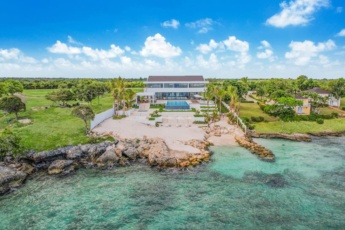
New & Luxury Casa de Campo Oceanfront Villa - With Private Beach, Large Pool, Top Amenities
from $14820 night Read moreIncorporating Dietary Adjustments
Dietary choices can play a surprising role in mosquito attraction. While food alone won’t completely deter bites, certain dietary adjustments can complement other preventive measures for a bite-free vacation.
1. Foods That Repel Mosquitoes
Some foods contain compounds that may help to naturally repel mosquitoes. Garlic, for instance, is rich in sulfur compounds that can act as a natural repellent. When consumed regularly, these compounds may exude through your pores, subtly deterring mosquitoes. Similarly, onions, a close relative of garlic, offer comparable benefits.
Incorporating foods rich in vitamin B1 (thiamine) like lentils, peas, and brown rice may also help. Though evidence is anecdotal, some suggest that thiamine alters body odor in a way that is less attractive to mosquitoes.
Foods That May Repel Mosquitoes
| Food | Compound | Potential Effect |
|---|---|---|
| Garlic | Sulfur compounds | Repellant odor |
| Onions | Sulfur compounds | Repellant odor |
| Lentils | Vitamin B1 | Altered body scent |
| Brown Rice | Vitamin B1 | Altered body scent |
2. The Impact of Alcohol and Sweets
Consuming alcohol may increase mosquito attraction, as it can enhance the emission of certain compounds in sweat that are attractive to mosquitoes. A study published in the Journal of the American Mosquito Control Association found that consumption of beer heightened mosquito attraction. Therefore, moderating alcohol intake, particularly in the evening when mosquito activity peaks, could be beneficial.
Similarly, a diet high in sugary foods might increase your appeal to mosquitoes. Sugars can alter the composition of your sweat, potentially making it more enticing. While cutting out all sweets isn’t necessary, being mindful of sugar intake can be a practical step in your mosquito-prevention strategy.
3. The Role of Vitamin Supplements
Vitamin supplements, particularly those containing vitamin B1 and B12, have been explored for their potential in repelling mosquitoes. Although scientific evidence is limited, some individuals report a reduction in bites when taking these supplements regularly.
Consider consulting a healthcare provider before starting any new supplement regimen, especially if you have underlying health conditions or are on medication.
Including vitamin-rich foods, such as spinach and fortified cereals, in your diet can provide similar benefits. The idea is that these vitamins might alter your natural scent in a way that is less appealing to mosquitoes, offering another layer of protection.

Casa de Campo Modern Villa for Rent - All-Inclusive Ocean View Villa with Chef, Butler & Maid
from $4493 night Read more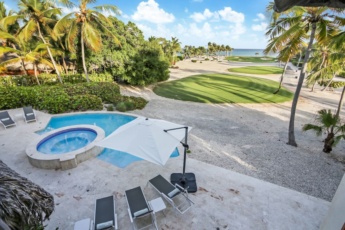
All-Inclusive Ocean View Cap Cana Villa With Chef, Butler, Maid, Pool, Jacuzzi & Eden Roc Beach Access
from $2364 night Read moreOur Best Ocean View Villa Rentals in Punta Cana
To fully enjoy your vacation without the nuisance of mosquito bites, consider staying at our exquisite ocean view villas in Punta Cana. These properties are designed with your comfort in mind, featuring mosquito-proof screens and fans to ensure a serene, bite-free environment.
First Aid for Mosquito Bites
Even with the best preventive measures in place, mosquito bites can sometimes be inevitable. Knowing how to effectively treat these bites can make your vacation much more enjoyable, ensuring that discomfort is kept to a minimum. Let’s explore practical steps for managing mosquito bites, from immediate relief techniques to recognizing when professional medical help is necessary.
1. Immediate Relief Techniques
Immediate relief
from mosquito bites is crucial to avoid discomfort and prevent further complications. When a mosquito bites, it injects saliva that causes an immune response, leading to itching and swelling. Here are some effective methods for quick relief:
- Cold Compress: Applying a cold compress or ice pack to the bite can help reduce swelling and numb the area, providing quick relief from itching.
- Topical Creams: Over-the-counter hydrocortisone creams or calamine lotion can soothe the skin and reduce redness and itching.
- Baking Soda Paste: Mixing baking soda with a little water to form a paste can neutralize the pH of the skin and reduce itchiness when applied to the bite.
- Aloe Vera: Known for its anti-inflammatory properties, aloe vera gel can cool the skin and speed up the healing process.
- Antihistamines: Oral antihistamines can help alleviate itching and swelling by counteracting the body’s histamine response.
2. Preventing Infection
Preventing infection
is essential after a mosquito bite to avoid further complications. Scratching the bites, although tempting, can break the skin and lead to infections. Here are some strategies to minimize the risk:
- Keep It Clean: Wash the affected area with soap and water to remove any bacteria and reduce the chance of infection.
- Don’t Scratch: As challenging as it might be, avoiding scratching is crucial. Keep your nails short to minimize damage if you do scratch.
- Use Antiseptics: Applying an antiseptic cream or lotion can help prevent bacteria from infecting the bite area.
- Cover the Bite: Using a bandage can help protect the area from dirt and further irritation.
3. When to Seek Medical Attention
While most mosquito bites are harmless, there are instances when professional medical attention is necessary. Knowing the warning signs can help you act promptly:
- Severe Allergic Reactions: Watch for symptoms like difficulty breathing, hives, or swelling beyond the bite area, which can indicate an allergic reaction.
- Infection Signs: If the bite area becomes increasingly red, swollen, or filled with pus, it may be infected and require antibiotics.
- Unusual Symptoms: Fever, joint pain, or body aches following a bite might indicate a mosquito-borne illness, necessitating immediate medical evaluation.
Understanding effective first aid for mosquito bites is essential for a comfortable and safe vacation. With these tips, you can enjoy your travels without the distraction of itchy, uncomfortable mosquito bites. Remember, if symptoms persist or worsen, it’s always best to seek professional medical advice.
Frequently Asked Questions
What are effective ways to keep mosquitoes away during a vacation?
To keep mosquitoes at bay, consider using insect repellent containing DEET or picaridin. Wear long sleeves and pants, especially during dawn and dusk when mosquitoes are most active. Installing mosquito nets and using fans or air conditioning can also help reduce mosquito activity indoors.
Are there natural alternatives to chemical mosquito repellents?
Yes, there are natural alternatives. Essential oils like citronella, eucalyptus, and lemongrass can be effective. However, they may not last as long as chemical repellents, so reapplication might be necessary. Always perform a patch test to ensure you don’t have an allergic reaction.
How can I protect my children from mosquito bites?
For children, use products specifically designed for their sensitive skin. Choose repellents with a lower concentration of DEET. Dress them in lightweight, long-sleeved clothing and use bed nets if you are in an area with a high mosquito population.
What should I do if I get bitten by a mosquito?
If bitten, wash the area with soap and water. Applying a cold pack can reduce swelling and itchiness. Over-the-counter creams like hydrocortisone can also provide relief. Avoid scratching to prevent infection.
How can I prevent mosquitoes in my accommodation?
Ensure windows and doors have screens. Use mosquito nets over beds and apply insect repellent to exposed skin. Consider using plug-in mosquito repellents or sprays to keep the area mosquito-free.
Are there any foods or drinks that can repel mosquitoes?
Some people believe that consuming garlic or vitamin B1 can repel mosquitoes, but scientific evidence is limited. It’s best to rely on proven methods like repellents and protective clothing.
What should I do if I suspect a mosquito-transmitted disease after my vacation?
If you experience symptoms like fever, rash, or joint pain after returning from a mosquito-prone area, seek medical attention immediately. Inform your doctor of your recent travels for appropriate testing and treatment.
How can I avoid mosquitoes while hiking or camping?
While hiking or camping, apply repellent frequently, wear protective clothing, and choose campsites away from standing water. Use a mosquito net for sleeping and consider using portable mosquito repellents designed for outdoor use.
